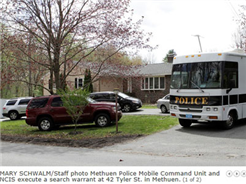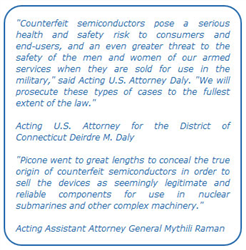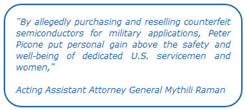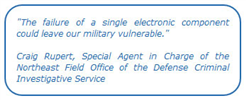Prosecuting Peter Picone - What resellers NEED to know
Kristal Snider & Mary Dunham, ERAI
ERAI, Inc.
On April 24, 2012 federal agents searched the office of Epic International Electronics, Inc., a home based business owned and operated by Peter and Lisa Picone. At the time the U.S. Department of Defense Criminal Investigative Services (DCIS) would only confirm the search was the result of an "active investigation". Fourteen months later, on June 25, 2013, Peter Picone was formally charged in an eightcount indictment with conspiring to traffic in counterfeit goods, conspiring to traffic in counterfeit military goods, trafficking in counterfeit goods, conspiring to commit wire fraud, wire fraud and conspiring to commit money laundering. All charges were the direct result of importing counterfeit semiconductors from China for resale in the United States while doing business as Epic International and previously as Tytronix, Inc. On June 3, 2014 Picone pled guilty to a single count of conspiracy to traffic in counterfeit military goods. He will be sentenced to a federal penitentiary in August. This is only the second prosecution on the relatively new charge of trafficking in counterfeit military goods, a federal crime enacted as part of the National Defense Authorization Act of 2011.
Integrated circuits (ICs) intended for use in a radio-transmitting test set and an alarm panel of an active-duty nuclear submarine were supplied by Picone after an employee of Epic assured its customer, "we take the best steps possible to avoid junk getting into the market, especially military." Virtually all of the parts being purchased by Picone originated from unauthorized Chinese sources.
Picone is part of a growing list of distributors being successfully prosecuted for sourcing ICs in China's dangerous, counterfeit filled open market. These suppliers all have one thing in common: they misrepresented and/or concealed the origin and true condition of the goods they were selling. "Many of Picone's customers specified in their orders that they would not accept anything but new (integrated circuits) that were not from China, but Picone told them that the ICs were new and manufactured in Europe," according to a case summary prepared by U.S. prosecutors.
In addition to familiarizing your organization with Title 18, United States Code, Section 2320 (trafficking in counterfeit goods or services), resellers should also look closely at the False Statements Accountability Act of 1996.
False Statements Accountability Act of 1996
There is no such thing as a "little white lie" when it comes to today's high stakes supply chain. If the parts are being sourced in China, disclose it. If the parts are coming from the open market, disclose it. If the parts' supply chain traceability has been broken and thus risk is introduced, disclose it. Failure to do so could result in serious legal repercussions.
The False Statements Accountability Act of 1996 states:
- Except as otherwise provided in this section, whoever, in any matter within the jurisdiction of the executive, legislative, or judicial branch of the Government of the United States, knowingly and willfully
- falsifies, conceals, or covers up by any trick, scheme, or device a material fact;
- makes any materially false, fictitious, or fraudulent statement or representation; or
- makes or uses any false writing or document knowing the same to contain any materially false, fictitious, or fraudulent statement or entry; shall be fined under this title or imprisoned not more than 5 years, or both.
Historically speaking, this statute has been used in cases involving perjury, false declarations, obstruction of justice and government fraud cases. Recently, however, it is being used when prosecuting trafficking in counterfeit goods cases, particularly if the origin of goods has been misrepresented.
A sales person falsely representing goods as OEM excess or erroneously claiming full supply chain traceability can be supplied upon request are examples that may fall under this Act. According to Keith Gregory, partner with Snell & Wilmer, "the word ‘whoever' in the statute permits the Federal Government to prosecute not only the salesperson who made the false representation, but also the principals of the company for whom the salesperson is employed pursuant to a criminal count alleging conspiracy."
In order for an action to be deemed criminal under 18 USC § 1001, it must be shown that the act or statement was material, was within the jurisdiction of a department or agency of the United States and was done knowingly and willfully.
When establishing whether the false statement is material, it is only necessary to prove that the statement has the capacity to influence a decision. One test that is commonly used can be found in United States v. Weistock, 231 F.2d 699, 701 (D.C. Cir. 1956):
"Material" when used in respect to evidence is often confused with "relevant", but the two terms have wholly different means. To be "relevant" means to relate to the issue. To be "material" means to have probative weight, i.e., reasonably likely to influence the tribunal in making a determination required to be made. A statement may be relevant but not material.
Many times a defense is raised that the alleged act or activity has no relation to the federal government so there is no federal jurisdiction. Be aware that the courts have construed this portion of the statute very broadly. The false statement does not have to be made to the government or a government representative as long as it is "within the jurisdiction" of the government. Counterfeiting falls within this jurisdiction.
Under 18 USC § 1001, the false statement, concealment or cover up must be "knowingly and willfully" done. The courts defined this concept in United States v. Lichenstein, 6510 F.2d. 1272, 1272-77 (5th Cir.):
"The statement must have been made with an intent to deceive, a design to induce belief in the falsity or to mislead, but § 1001 does not require an intent to defraud – that is, the intent to deprive someone of something by means of deceit."
The courts have held that if a defendant can learn whether their statement is true or not, lack of knowledge is not a viable defense. According to the courts, "willfully" means that the act was done deliberately and with knowledge. No evil intent needs to be proven.
It is important to note that false statements that can be prosecuted under this statute may be made directly to a federal agency, to a private person or institution which implements federal programs and in business records that may be subject to federal government inspection. All that is necessary to establish jurisdiction is that the false statement touch on a federal interest.
To avoid any chance of being subjected to the False Statements Accountability Act, when quoting your customers, keep it simple and honest and do not make claims that cannot be substantiated.
Resources
Indictment: 6-25-2013 – United States v. Peter Picone
http://www.efcog.org/wg/ism_qa_scqtt/docs/minutes/Indictment.pdf
Press Release: 7-15-2013 – Department of Justice Press Release - "Massachusetts Man Charged with Selling Counterfeit Semiconductors Intended for Use on Nuclear Submarines"
http://www.justice.gov/opa/pr/2014/June/14-crm-595.html
Plea Agreement: 6-3-2014 – United States v. Peter Picone
http://www.erai.com/customuploads/GuiltyPlea.pdf
Title 18 – § 2320. Trafficking in counterfeit goods or services:
http://www.gpo.gov/fdsys/pkg/USCODE-2011-title18/pdf/USCODE-2011-title18-partI-chap113-sec2320.pdf
Conspiracy to Traffic in Counterfeit Military Goods
COUNT TWO (Conspiracy to Traffic in Counterfeit Military Goods)
"From in or about January 2012 through in or about April 2012, in the District of Connecticut and elsewhere, defendant PETER PICONE, and others known and unknown to the grand jury, knowingly did conspire, combine, confederate, and agree with each other to commit an offense against the United States; to wit, intentionally to traffic and attempt to traffic in goods, knowing that such goods were counterfeit military goods, the use, malfunction, and failure of which were likely to cause serious bodily injury and death, the disclosure of classified information, impairment of combat operations, and other significant harm to a combat operation, a member of the Armed Forces, and to national security, in violation of Title 18, United States Code, Section 23209(a)(3). "
SEE MORE BLOG ENTRIES
|

Evidence Collection




Search Warrant Execution
|